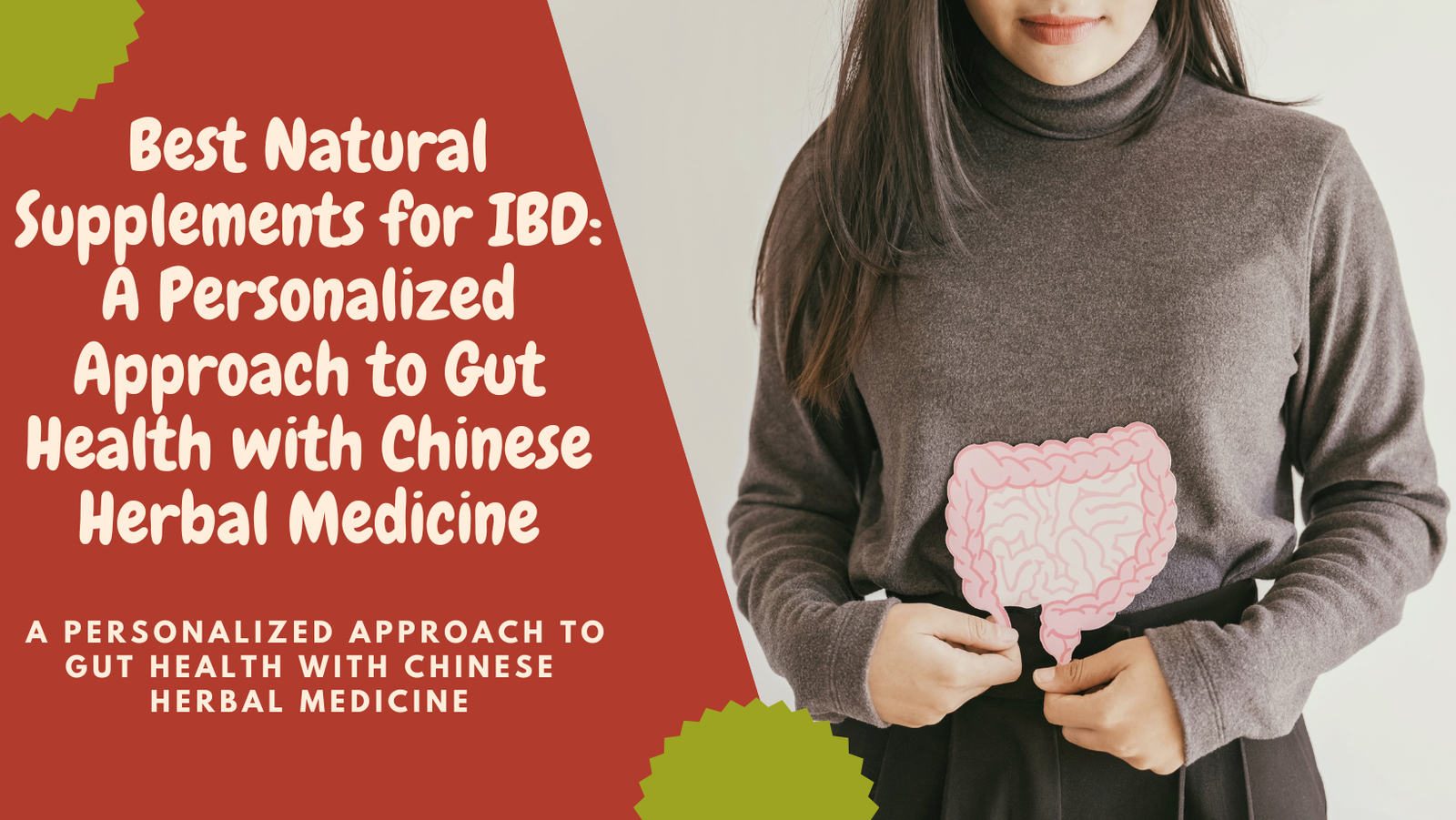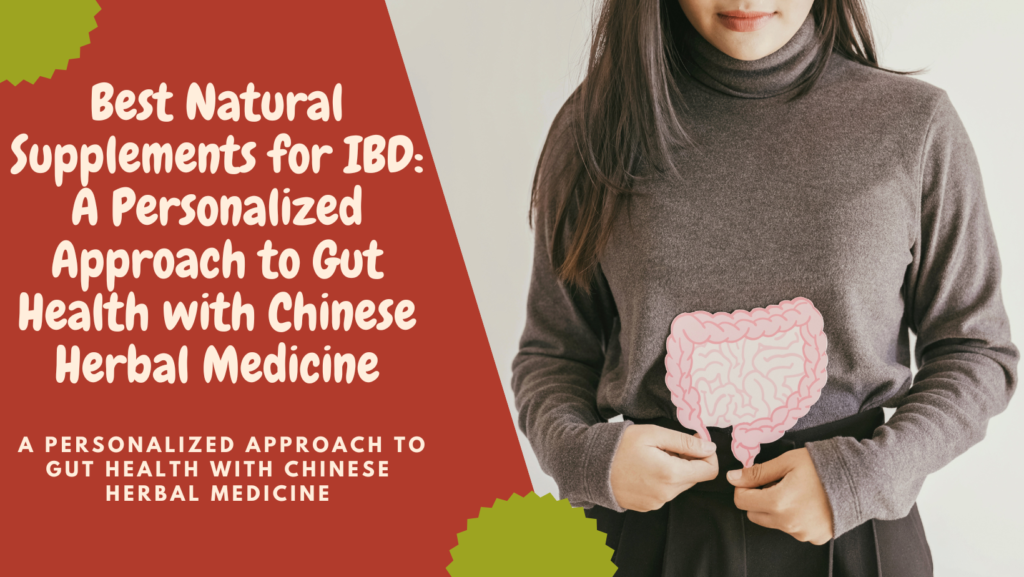Physical Address
304 North Cardinal St.
Dorchester Center, MA 02124
Physical Address
304 North Cardinal St.
Dorchester Center, MA 02124

Contents
The relentless grip of Inflammatory Bowel Disease (IBD) i.e. ulcerative colitis and Crohn’s disease, can leave you feeling drained, isolated, and desperate for relief. The constant battle with inflammation, pain, and digestive distress can take a significant toll on your physical and emotional well-being.
But you’re not alone. Millions of people worldwide are searching for natural solutions to manage their IBD symptoms. Formulas from traditional Chinese medicine are an effective way to reduce IBD inflammation naturally.
Let’s delve into the categories of herbal medicinals and natural therapies for IBD.

The use of plant-based medicinals stretches back to the oldest records of Chinese medicine. It was the mythological figure ShenNong, who taught agriculture and nutrition way back in 2500 BCE. He is credited with discovering and documenting more than 365 plant and herb medicinals. Around 1500 BCE the physician and cook, YiYin took herbal medicine to the next level, when he developed ways of combining plant medicinals to improve treatment responses. His combinations helped minimize side effects while simultaneously compounding each plants’ inherent therapeutic effects. Over the following centuries, doctors continued to test and record the different effects of herbal remedies. The most well known and comprehensive was the physician Li ShiZhen of the Ming Dynasty (late 16th century CE). He self-tested all manner of natural products, sampling whatever he encountered, and recording all relevant information. In the end he compiled a detailed list of the medicinal effects of several thousand plant, mineral and animal materials.
Many natural remedies for IBD i.e. ulcerative colitis and Crohn’s disease can be pulled from these classical options. And current research is validating how they improve ibd symptoms naturally.
Below are the most commonly used herbs for IBD, divided into their classical categories. For herbal medicine treatment of IBD, it is critical to understand the system of classical diagnosis and select the appropriate options. IBD natural treatment plans should be based on a combination formula carefully selected for each unique patient.
are used to clear heat (redness, swelling, ulceration, fever, etc) from the surface tissues. They have immunomodulating and calming effects
Example selections:
Angelica dahurica root (bai zhi)
Pueraria Root (ge gen)
Research findings:
葛根Pueraria Root (ge gen)
Improves mucosal membrane integrity and regulates stress responses through interactions of the hypothalamus adrenal axis.
with additional draining fire herbs and/or drying dampness action. These are the powerful anti-inflammatories. The draining fire type are very powerful, with whole body inflammatory reduction yet can be targeted for emphasis on a body region or tissue type. The drying dampness type are strong with anti-inflammatory properties and simultaneously help to clear away exudate and inflammatory waste to accelerate wound healing in ulcerative conditions.
Example selections:
Anemarrhenae rhizome (zhi mu)
Gypsum (shi gao)
Gardenia Fruit (zhi zi)
Rhizoma Phragmitis (lu gen)
Scute root (huang qin)
Coptis Rhizome (huang lian)
Phellodendron (huang bai)
Sophora root (ku shen)
Sweet wormwood (qing hao)
Dandelion (pu gong ying)
Honeysuckle flower (jin ying hua)
Research findings:
黃芩 Scute Root (huang qin)
Strong anti-inflammatory effects. And experimental research has shown a reduction in damage to the intestinal wall and restoration of gut microbiota homeostasis. Scute is highly concentrated in baicalin.
黃連 Coptis Stem (huang lian)
Strong anti-inflammatory effects and anxiolytic action. Experimental research demonstrates improvement in IBS symptoms. Coptis is highly concentrated in berberine.
青蒿 Sweet wormwood (qing hao)
Protects and restores the lower GI tract lining. And has been shown in research to reduce symptoms of Crohn’s disease, even during discontinuation protocol from steroids.
have anti-diarrhea effects, they assist in regulating fluid reabsorption and nourish the gut with preibiotic material.
Example selections:
Poria (fu ling)
Alisma (zexie)
Ployporus Umbellatus (zhuling)
Jobs tears (yi yi ren)
Research findings:
澤瀉 Alisma (ze xie)
Provides prebiotics, assists in restoring healthy gut microbial activity, and solidifies intestinal barrier integrity.
have several broad effects in maintaining health and are commonly used supplements to repair, strengthen and protect all levels of the body. Specific to the treatment of IBD conditions, these herbs balance the immune system, improve digestive absorption and accelerate tissue repair.
Example selections:
Tangerine peel (chen pi)
Immature bitter orange (zhi shi)
Ginseng (ren shen)
Codonopsis Root (dang shen)
Astragalus root (huang qi)
Atractylodes (cang zhu)
Licorice Root (gan cao)
Chinese Yam (shan yao)
Research findings:
甘草 Licorice Root (gan cao)
An anti-inflammatory and pro-digestive herb. Research demonstrates a reduction of both inflammation and edema of the colon in ulcerative colitis-induced mice.
黃耆Astragalus (huang qi)
Promotes regeneration of healthy tissue and some anti-inflammatory support. Research shows astragalus to enhance mesenchymal stem cell (MSC) differentiation and proliferation and suppress TNF-a.
are used for symptoms of bleeding in the lower digestive tract.
Example selections:
Garden burnet root (di yu)
Sophora flower (huai hua)
Red Peony Root (chi shao)
Moutan root bark (mu dan pi)
Research findings:
地榆 Garden burnet root (di yu)
Is used for chronic diarrhea, lower GI ulceration, and blood or mucus in the stool. Research also shows that it suppresses TNF-a, and laboratory studies have identified several of the terpenes from this herb that have a hemostatic effect.
In all of the above categories, it would be unusual to use just one selection independently. Rather a custom pairing and precision dosing of multiple herbs in combination is the preferred method for developing a holistic treatment for ibd.
FHC Consultation and Personalized Plant-Prescription Service
Please join our mailing list for more useful information. And if you’d like to discuss your condition, please schedule a telehealth consultation with Dr.Marc.
Articles, commentary, and graphics on this blog are for information purposes only. None of which are intended to substitute for medical advice nor to be regarded as such. Readers must consult with their professional health care provider before engaging in any change in lifestyle, activity, nutrition, or treatment. The owner of this blog is not to be held responsible for any injury or harm incurred due to lack of consultation with a local professional health care provider. Communication through the comments section does not establish a doctor patient relationship and the owner of this blog is not responsible for comments made in reply forums. Medical research is a constantly changing field, thus we make no guarantees that the information provided is accurate, true, or up to date. Content on this blog is in no way intended to offend any medical or medical research groups.